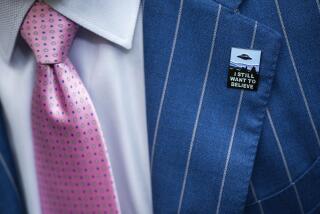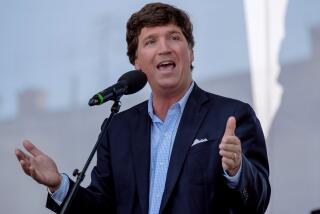CBS Westmoreland Story Substantiated, Producer Says : Program’s Main Assertions Backed by Military and Civilian Witnesses, Crile Testifies
- Share via
NEW YORK — The producer of the controversial CBS documentary that led to Gen. William C. Westmoreland’s $120-million lawsuit against the network contended Friday that the major assertions of the program had been supported by both military and civilian witnesses.
Saying Westmoreland’s command in Vietnam had committed an “intellectual atrocity” by manipulating estimates of enemy troop strength, producer George Crile told a federal jury he believed the general’s reports to his superiors had been both inaccurate and dishonest.
Westmoreland, who commanded U.S. troops in the Vietnam War from 1964 until 1968, contends he was libeled by the 1982 broadcast, “The Uncounted Enemy: A Vietnam Deception.” The program accused the general of deceiving President Johnson in l967 by underestimating enemy strength to support a contention that the war was going well.
A Painstaking Journey
Crile’s categorical defense of the broadcast came as lawyers for the network led him on a painstaking journey through the 90-minute program. As the jury watched on courtroom television monitors, a showing of the program was interrupted dozens of times to permit Crile to once again justify every substantial point in the program. When the examination was completed, defense attorney David Boies challenged Westmoreland’s lawyers to specify the statements in the broadcast that they contend are false.
“One thing you have not heard during this trial,” Boies told the jury, “is a specification from the plaintiff of exactly what there is . . . that the plaintiff believes is false.”
Challenge Rejected
Westmoreland’s attorneys, who kept Crile on the witness stand for nine days last October, did not accept the challenge to make Crile defend the broadcast point by point.
Instead, Dan Burt, the general’s lead attorney, asked Crile several questions about whether he considered the 1968 Tet offensive to have been a major military victory for the United States.
Crile was called back to the stand by defense attorneys in an effort to show that the broadcast involved neither malice nor reckless disregard for the truth.
In order to collect damages, Westmoreland must show not only that the charges against him were untrue but that there was malice and reckless disregard for the truth on CBS’s part at the time of the broadcast.
No Wish to Hurt Military
Under questioning by Boies, Crile insisted Friday that there had been no desire on the part of any of CBS’s witnesses to discredit the military in any way.
Intelligence officers who appeared in the program, Crile contended, “had nothing to gain whatsoever” and had spoken out because they thought it was time for a “reckoning” and did not want to see a repeat of incidents reported in the documentary.
Earlier in his testimony, Crile told the jury: “This was not a story that relied upon one or two sources. It was a story that had multiple sources . . . that added up to a scream from the intelligence officers that something wrong had taken place.”
CBS’s version of a long-running intelligence controversy was that Westmoreland’s command suppressed evidence that the enemy had as many as 200,000 more troops than were being reported in official documents sent to the nation’s policy-makers.
The controversy raged for several months just prior to the January, 1968, Tet offensive.
Westmoreland contended that Viet Cong self-defense and secret self-defense forces should be dropped from the enemy strength count because they had no offensive military capability. The documentary charged that was a way of staying under a ceiling of 300,000 which it said Westmoreland had imposed on the enemy count.
More to Read
The complete guide to home viewing
Get Screen Gab for everything about the TV shows and streaming movies everyone’s talking about.
You may occasionally receive promotional content from the Los Angeles Times.





